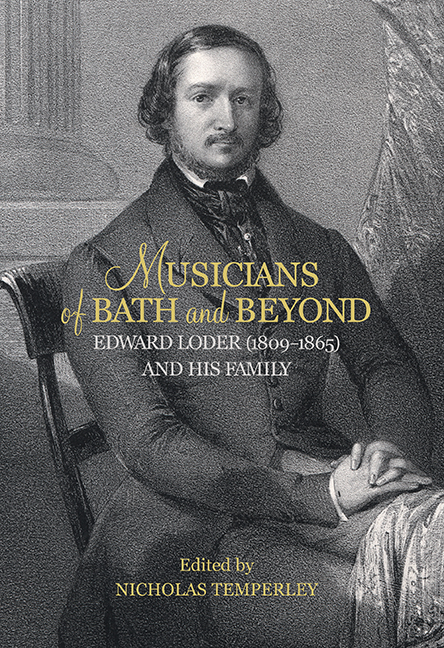Book contents
- Frontmatter
- Contents
- List of Illustrations
- Acknowledgments
- Notes on Contributors
- The Loder Family Tree
- Abbreviations
- Introduction
- PART ONE The Musical Profession in Early Nineteenth-Century England
- PART TWO The Loder Family
- PART THREE The Music of Edward Loder
- EPILOGUE The 1966 Revival of Raymond and Agnes
- Select Bibliography
- Index of Edward Loder’s compositions
- General Index
- Miscellaneous Endmatter
2 - The Musical Life of Bath, 1800–1850
Published online by Cambridge University Press: 04 June 2021
- Frontmatter
- Contents
- List of Illustrations
- Acknowledgments
- Notes on Contributors
- The Loder Family Tree
- Abbreviations
- Introduction
- PART ONE The Musical Profession in Early Nineteenth-Century England
- PART TWO The Loder Family
- PART THREE The Music of Edward Loder
- EPILOGUE The 1966 Revival of Raymond and Agnes
- Select Bibliography
- Index of Edward Loder’s compositions
- General Index
- Miscellaneous Endmatter
Summary
‘This is a ball-night,’ said the M.C., again taking Mr Pickwick's hand, as he rose to go. ‘The ball-nights in Ba-ath are moments snatched from Paradise; rendered bewitching by music, beauty, elegance, fashion, etiquette, and – and – above all, by the absence of tradespeople, who are quite inconsistent with Paradise; and who have an amalgamation of themselves at the Guildhall every fortnight, which is, to say the least, remarkable.’
ALFRED Barbeau's judgement on the subject of Bath after 1800 has tended to colour subsequent received opinion. He notes that in Jane Austen's Northanger Abbey (set in the late 1790s) the Thorpes and Allens found that in Bath ‘there was not a genteel face to be seen in the Pump Room.’ He goes on to say that ‘twenty or thirty years later, it was nothing but a little English town, similar but for its memories, to any other pleasant provincial capital, differing from those only by virtue of its thermal waters, and the presence of the invalids attracted by them.’ Certainly by 1835 the orientation of Bath around the season had largely gone, and the city had changed economically and politically into one based on the accommodation of a more permanent middle-class population, many of whom were retired or infirm.
Yet for Bath's music the picture that Barbeau paints of decline into mediocrity is too simplistic. Throughout the first half of the nineteenth century Bath remained an important centre for concerts, the theatre, and church and chapel music, as well as for the music trade and music teaching. As the domination of the city's musical events by professionals gave way to music clubs and societies that included participating amateurs, so many of the old musical institutions died, or were altered out of all recognition. By the mid-nineteenth century, despite all that had changed, there were few places in Britain outside of London where music was a more prominent part of the social fabric.
During the eighteenth century Bath had developed into a leading centre for music in Britain, with a weekly round of events for musicians during the spa season (November to April), and garden music and gala concerts out of season. With a population that rose to 34,163 in 1801, a ten-fold rise over a hundred years, it was still the foremost spa town in Britain.
- Type
- Chapter
- Information
- Publisher: Boydell & BrewerPrint publication year: 2016

